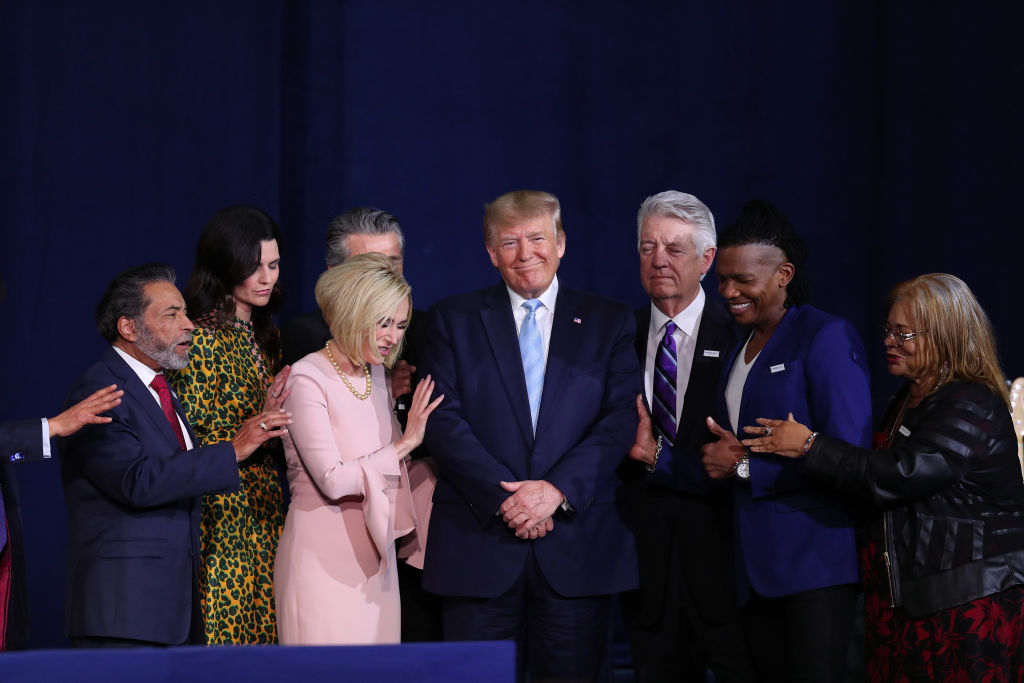Ron DeSantis’s presidential campaign may have ended on Sunday, January 21st, but whatever competition Trump may have faced for the hearts of white evangelical voters ended months ago. Perhaps “competition” is being too generous. In poll after poll, Trump maintained double-digit leads over his rivals among white evangelicals. Yet there were flickers of hope that Trump’s evangelical support was vulnerable, particularly among the most devout.
[time-brightcove not-tgx=”true”]
But they were only flickers.
In March 2023, psychologist Joshua Grubbs and I asked a national sample of Americans who they planned on voting for in the next Presidential election. Among white evangelical voters who identified as Republican, 53% said they would vote for Trump while 31% favored DeSantis. Less than 1% said they would vote for Joe Biden. In other words, over a year before Republicans would need to decide their presidential candidate, Trump already enjoyed majority support among white evangelicals.
Yet when we split the sample by church attendance, we found only 48% of white evangelical Republicans who attend at least monthly planned on voting for Trump, compared to 61% of those who attend less than once a month. DeSantis’s support stayed at around 31% either way (the gains were mostly for Mike Pence who dropped out in October), but Trump enjoyed less dominance among the most devout. Other polls around this time also suggested evangelical support for Trump could be wavering. Flickers of hope for would-be rivals.
But by late Fall of 2023, white evangelicals were once again unifying around Trump. When Pew Research Center asked white evangelical Republican voters about their primary preferences, 55% said they would vote for Trump. And importantly, this percentage was identical among those who attend church at least monthly and the less frequent attendees. DeSantis did enjoy greater support among the monthly churchgoers (21% compared to 13%), but the 17% lead Trump enjoyed among the more devout in Spring 2023 had doubled to 34% 9 months later.
Read More: The Surprising Voters Driving Trump to Victory
What changed? Did Trump start courting white evangelicals again like in 2016? Not really. In fact, Trump hasn’t made many public appearances at all compared to other GOP primary candidates, and very few on the Christian right circuit. Did white evangelical thought leaders start campaigning for Trump in earnest over the past year? Again, not really. Some fringe far-right pastors never left him. But a number of prominent evangelical leaders, authors, and pastors, some of whom previously endorsed Trump, publicly endorsed DeSantis.
Rather than focusing on anything Trump or evangelical leaders have done to solidify Trump’s evangelical support, there are two more likely explanations.
The first is that white evangelicals, and especially the most devout ones, are ride-or-die partisans. The more often white evangelical voters attend church, the more likely they are to identify as Republican. For example, when I analyze data from Pew Research Center’s American Trends Panel Survey, Wave 114, I find that less than 48% of white evangelical voters who “Never” attend church are Republicans, while nearly 73% of those who attend more than once a week identify that way.
Trump is the Republican party now. And thus, while a minority of devout white evangelicals may have entertained other political options a year before the primary would be decided, as Trump’s victory became more inevitable, any reluctant supporters among the most committed fell into line. Even when evangelical theologian Wayne Grudem called for Trump to drop out of the race, he wasn’t standing against Trump (whom he praised). Rather, he merely thought Trump would lose against Biden. The issue was party victory, not principle.
The second reason evangelicals have rallied to Trump again is because they are not only partisans but culture warriors who still feel under attack. And despite DeSantis’s best efforts to sell himself as an anti-woke, no apologies, warrior for religious conservatives, the majority of evangelicals either never bought it or simply had more confidence in Trump as their warrior king. As journalist Tim Alberta has described the white evangelical mindset, “The barbarians are at the gates, and we need a barbarian to keep them at bay.” Trump is nothing if not a convincing barbarian.
We shouldn’t oversell the rivalry that wasn’t. Trump was always the evangelical favorite even among the most devout. He has been the favorite among white evangelicals, regardless of their church attendance, since well before the primaries were decided in January 2016. Even then, Pew data showed white evangelicals across the board were more enthusiastic about his potential as a President.
Trump has white evangelicals in his pocket. Whatever cognitive dissonance some devout Christians may feel for supporting a twice-impeached serial philandering liar who tried to stage a coup and threatens violence against political opponents is easily dismissed with the conviction that no Republican nominee, no matter how problematic, could be worse than losing to a Democrat.
Understand the American religion of fanatical partisanship and culture-warring and you understand why white evangelicals will always fall in line. As Nikki Haley is learning all over again.

